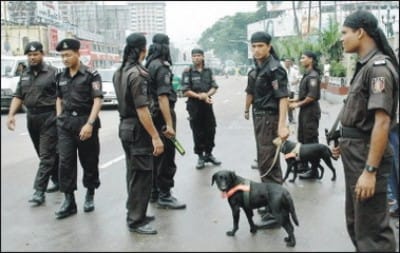Five years of RAB

Our men in black.Photo: STAR
ON March 26, the Rapid Action Battalion (Rab) completed what may be termed its "early evolutionary period." From its inception, Rab has drawn the public's attention, and a perceptual shift has taken place in people's minds during this time about Rab's image. This article shares insights into how the journey has been so far for Rab.
Rab was launched at a time when law and order was at such a poor level that the police were unable to manage the situation. Earlier an army-led operation titled "Operation Clean Heart" had taken place, which provided a brief respite, but the army could not be expected to maintain law and order on a regular basis.
There was need for a specialised force that could act swiftly, decisively, and efficiently to deal with serious crimes and top-notch criminals, and Rapid Action Battalion (Rab) was born. The creation of Rab during a political regime and the role of the then state minister of the home ministry raised scepticism about the true motives for creation of this elite force.
The first and lasting impression of Rab is the black uniform that makes it stand out from others. Then are the black bandanna, black sunglass, sub machineguns, and yellow coloured Rab written on the black uniform. The uniform and the aggressive posturing drew the attention of the people. Open patrol jeeps, speedy bikes, and the cobra logo gave Rab an identity of its own.
Given the presence of officers and soldiers from the armed forces, police, coast guard, and ansar, Rab was perceived as a force with professional competency. The presence of army officers in operations and intelligence initially led many to believe that Rab was mostly a force run by the army under a civilian disguise. Over time, and the public appearances by the director general of Rab, who comes from police, this impression gradually changed.
What emboldened Rab most were its operations against JMB. The detonation of bombs by JMB in 63 districts on August 17, 2005 showed the people how big a threat it had become. The success in the drive against JMB helped Rab to be recognised as a vital instrument for fighting organised terrorists.
Gradually Rab expanded its activities into the social sphere. Its drive against alcohol and narcotics, particularly yaaba, was appreciated by all. To parents of many youngsters, who can go astray under wrong influence, this operation brought much relief. Pornographic movies have negatively affected socio-cultural values, resulting in behaviour inconsistent with Bangladeshi culture. Hence, Rab's foray into this domain was welcome. Rab also earned kudos by recovering priceless artifacts stolen by organised gangs. .
With internet and cyber activities has emerged a new class of criminals who misuse unfettered access to information and electronic exchanges for undesired objectives. Rab's access to state of the art technology has helped it to be ahead of other law enforcers in tracking, identifying, apprehending, and putting to justice such criminals. Rab also has been praised for its crackdown on illegal VOIP business. This has resulted in a large increase in government revenue.
One complaint against Rab is its poor human rights record. Incidents of cross-fire and extra-judicial killings were severely criticised by human rights groups. However, with support from development partners and friendly countries, Rab is raising awareness of its members on HR issues so that civil rights are protected even when law is being enforced.
Although incidents of cross-fire have significantly gone down recently, much still needs to be done to make Rab alive to human rights concerns.
From speedy dissemination of reliable information to catering to the needs of the media, Rab's Media Cell has made a positive impression on many. More exchanges are needed between Rab and the people to help develop better understanding of the operational mandate of Rab and the expectations of people from this elite force. Improved accessibility of the people has helped Rab in gaining acceptability.
Rab's success in quelling JMB operations, fighting terrorists and apprehending hardened criminals has generated confidence in stakeholders, both at home and abroad, to extend support for professional development of Rab. Training is provided through both in-house and external agencies. Through establishment of Rab Training School, Rab has put the right emphasis on a critical area if it is to become an effective crime-busting unit.
For a law-enforcing agency to be effective, there is no option but to adapt itself to the changing needs of the time. If criminals remain ahead of law enforcers in technology and knowledge, the operational effectiveness of the agencies would be in jeopardy. Time has come for Rab to think more strategically as opposed to merely operationally. Foreseeing next generation crimes and gauging the human and logistical support needed to respond to those challenges involves a comprehensive understanding of the past, present, and future.
That will be the real challenge for an organisation like Rab to meet in the days to come. The process should start sooner than later as crimes may wait, but criminals don't. Rab can't wait either, as the key to success for an elite crime-busting unit lies in being more proactive than reactive. In this relentless journey, there is no room for complacency.

 For all latest news, follow The Daily Star's Google News channel.
For all latest news, follow The Daily Star's Google News channel. 



Comments